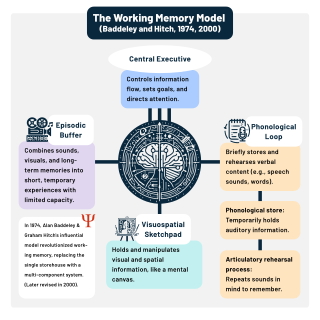Alan Baddeley
British psychologist (born 1934) From Wikipedia, the free encyclopedia
Alan David Baddeley CBE FRS (born 23 March 1934) is a British psychologist. He is known for his research on memory and for developing the three-component model of working memory. He is a professor of psychology at the University of York.
Alan Baddeley | |
|---|---|
| Born | Alan David Baddeley 23 March 1934 Leeds, Yorkshire, England |
| Nationality | British |
| Education | University College London Princeton University University of Cambridge (PhD) |
| Known for | Neuropsychological tests, Baddeley's model of working memory |
| Awards | CBE FRS (1993) |
| Scientific career | |
| Institutions | University of York |
| Thesis | The Influence of Acoustic and Semantic Similarity on Long-term Memory for Word Sequences (1962) |
Biography
Baddeley was born in Leeds, Yorkshire on 23 March 1934.[1] He lived there with his parents, Donald and Nellie Baddeley, until leaving for university.[2] He decided to study psychology and was originally interested in psychoanalysis. Later he changed his focus to evidence-based psychology.[3] In 1956, Baddeley went to the United States of America to continue his studies. After spending a year in America, he returned home. He then went to Cambridge, where he met and married Hilary Ann White. Baddeley and his wife have three sons.[2]
Baddeley has taught and conducted research at University of Sussex, University of Stirling, MRC Applied Psychology Unit, Churchill College, University of Cambridge, and University of Bristol. He is currently a professor of psychology at the University of York.[4]
Education
Baddeley attended the University College London from 1953 to 1956. He then obtained an MA from Princeton University's Department of Psychology in 1957. He earned a PhD from University of Cambridge in 1962.[5] He has been awarded Honorary Doctorates by University of Essex in 1999,[6] Plymouth University in 2000,[7] and University of Bristol in 2019.[8]
Career and research
Summarize
Perspective
In 1974, working with Graham Hitch, Baddeley developed an influential model of working memory called Baddeley's model of working memory,[9] which argues for the existence of multiple short-term memory stores and a separate interacting system for manipulating the content of these stores. There are three components of this model: the phonological loop, the central executive, and the visuospatial sketch pad.[9] In 2000, Baddeley suggested adding a fourth component to his memory model called the episodic buffer.[10] The model accounts for much of the empirical data on short-term retention and manipulation of information.

His landmark study in 1975 on the capacity of short-term memory[11] showed that people remembered more short words than long words in a recall test. This was called the word length effect and it demonstrated that pronunciation time rather than number of items determines the capacity of verbal short-term memory. This study also found that when participants repeated an irrelevant sound while reading the words, the word length effect does not happen.[11]
Working with Barbara Wilson, Baddeley also did several important studies on amnesia and memory.[12][13] They studied patients with temporal lobe damage that caused memory problems. Results of such studies provide evidence that short-term and long-term memory are not one system. The amnesia patients had normal short-term memory but impaired long-term memory.[14]
Baddeley has also done research studies using divers and various underwater conditions. He studied the effects of depth and pressure on dexterity,[15] the impact of temperature on response time,[16] and context-dependent memory on land and underwater.[17]
Baddeley was the director of the Cognition and Brain Sciences Unit, a branch of the UK Medical Research Council, based in Cambridge, from 1974 - 1997.[18] He was elected a Fellow of the Royal Society in 1993[19] and in 1996, was elected a Foreign Honorary Member of the American Academy of Arts and Sciences.[20] In 2001, Baddeley received the American Psychological Association (APA) Award for Distinguished Scientific Contributions.[21] Baddeley was given the Lifetime Achievement Award by the British Psychological Society in 2012.[22] He also received the Major Advancement in Psychological Science Prize from the International Union of Psychological Science in 2016.[23]
Other notable works
Baddeley has also part authored a number of neuropsychological tests including the Doors and People,[24] Children's Test of Nonword Repetition (CN REP),[25] the Rivermead Behavioural Memory Test (RBMT),[26] Autobiographical Memory Interview (AMI),[27] Visual Patterns Test (VPT)[28] and the Speed and Capacity of Language Processing Test (SCOLP).[29]
Baddeley was involved in the design of United Kingdom postcodes,[30] and was one of the founders of the European Society for Cognitive Psychology.[31]
References
External links
Wikiwand - on
Seamless Wikipedia browsing. On steroids.